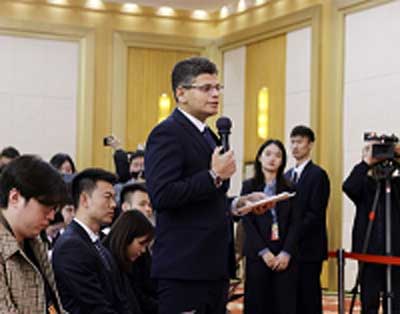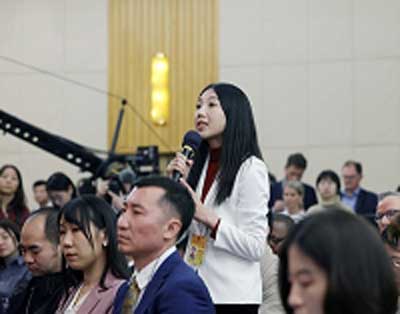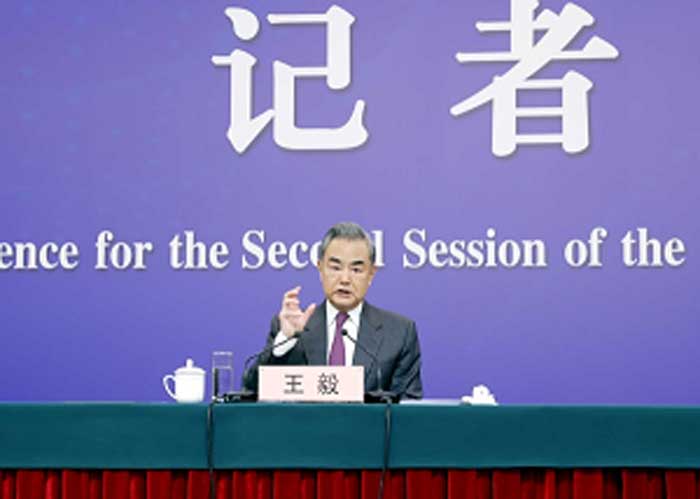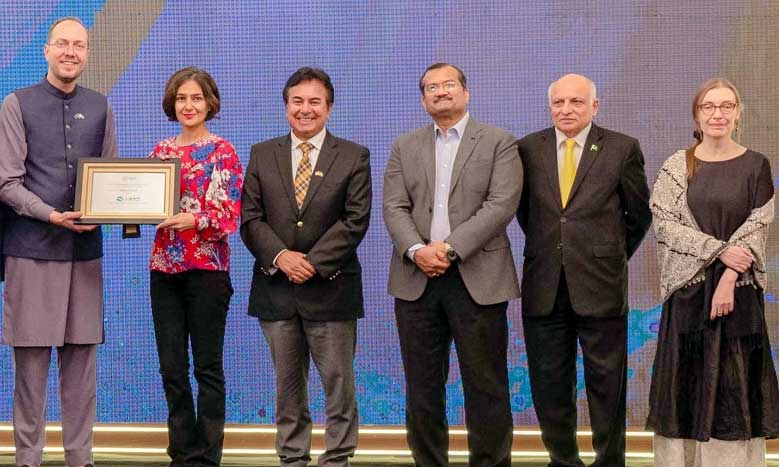
Nile News Egyptian Network: How can the international community provide protection necessary for the Palestinian people? China’s just position on the Palestinian question has been commended by Arab countries. What will be the way out of the Palestinian-Israeli conflict? What role will China play to this end?
Wang Yi: The current Palestinian-Israeli conflict has caused 100,000 civilian casualties, and countless innocent people remain buried under the rubble. There is no distinction between noble and humble lives, and life should not be labeled by race or religion. The failure to end this humanitarian disaster today in the 21st century is a tragedy for humanity and a disgrace for civilization. Nothing justifies the protraction of the conflict, or the killing of the civilian population. The international community must act promptly to promote an immediate ceasefire as its overriding priority and ensure humanitarian assistance as its pressing moral obligation. People in Gaza have the right to life in this world, and women and children deserve the care from their families. All detainees should be released, and all actions that harm civilians should be stopped.
The calamity in Gaza is another wake-up call for the world that the long occupation of the Palestinian territories is a fact that should not be ignored anymore, and that the long-cherished aspiration of the Palestinians for an independent state should not be evaded anymore. More importantly, the historical injustice to the Palestinians must not be allowed to continue uncorrected from generation to generation. Restoring justice to the Palestinian people and fully implementing the two-State solution is the only way to break the vicious cycle of Palestinian-Israeli conflicts, to eliminate the breeding ground of extremist ideologies, and to realize enduring peace in the Middle East.
China firmly supports the Palestinian peoples’ just cause of regaining their legitimate national rights, and is always committed to a comprehensive, just and lasting solution to the question of Palestine at an early date. We support Palestine’s full membership in the U.N., and urge certain U.N. Security Council member not to lay obstacles to that end. We call for a more broad-based, more authoritative, and more effective international peace conference to work out a timetable and road map for the two-State solution. We believe that Palestine and Israel should resume peace talks as soon as possible to achieve the ultimate goal that they coexist in peace as two states and the Arab and Jewish peoples live in harmony as two ethnic groups. China will continue to work with the international community to restore peace, save lives, and uphold justice.

Beijing Youth Daily: Over the past year, China mediated the resumption of diplomatic ties between Saudi Arabia and Iran, the de-escalation in northern Myanmar, among others. These diplomatic efforts were highly commended by the international community. Many say that only China is capable of doing that. Could you share with us what makes China’s mediation successful?
Wang Yi: Constructive engagement in settling international hotspot issues is a due responsibility for China as a permanent member of the U.N. Security Council. We learn from international practices and draw wisdom from Chinese culture, and we have found the Chinese way to address hotspot issues. In my view, the following four commitments are vitally important.
First, a commitment to non-interference in internal affairs. China always respects the sovereignty and territorial integrity of the countries concerned, and plays good offices in light of their needs and wishes and in line with the U.N. Charter.
Second, a commitment to political settlement. In addressing disagreements and disputes, willful use of force should not be allowed, let alone relying obsessively on pressure and sanctions. What is needed is to advance dialogue and consultation with the utmost patience and find the biggest common ground that accommodates the needs of all sides. On all hotspot issues, China always promotes talks for peace. We never add fuel to the fire.
Third, a commitment to objectivity and impartiality. China forms its stance based on the merits of each issue. We do not use double standards, or favor one side over the other, or seek selfish geopolitical interests. All peoples in the world have a sense of justice in their hearts. Credibility comes before influence.
Fourth, a commitment to addressing both symptoms and root causes. It is important to deflate tensions as quickly as possible to prevent escalation or spillover, and at the same time, it is also crucial to look into the root causes in a systemic and dialectical way and take a holistic approach to resolving disputes. Band-aid solutions are not advisable, nor are short-sighted, utilitarian, or finger-pointing tactics.
Our world is far from being tranquil, and peace needs to be upheld by us all. We will work with all countries to build consensus for ending conflicts, pave the way for peace talks, and strive for a world of lasting peace and common security.
Agencia EFE: What are the prospects regarding China’s relationship with the European Union? What does China expect from Europe? And why does China think some European countries have so far not joined the Belt and Road Initiative (BRI)?
Wang Yi: Last year was the 20th anniversary of the China-EU comprehensive strategic partnership. The two sides relaunched exchanges and dialogue across the board at all levels. The China-Europe Railway Express ran more than 17,000 cargo trips connecting 219 cities in 25 European countries. It is a lifeline that ensures safe and unimpeded industrial and supply chains in a turbulent world. China rolled out visa-free policies for quite some European countries, facilitating travels and business exchanges. On the BRI you mentioned, in fact, there have been many successful China-Europe cooperation projects under the Initiative. The Budapest-Belgrade railway link, the Port of Piraeus in Greece and the Pelješac Bridge in Croatia are just a few typical examples.
A few years back, an EU policy paper labeled China as a partner, competitor and systemic rival at the same time. However, facts have shown that this characterization is neither consistent with reality nor viable. On the contrary, it only caused distractions and created obstacles for China-EU relations. It’s like driving to a crossing and finding the red, yellow and green lights all on at the same time. How can you drive on?
In fact, China and Europe do not have clashing fundamental interests between them, or geopolitical and strategic conflicts. Their common interests far outweigh their differences. In the context of China-EU relations, the two sides should be characterized rightly as partners. Cooperation should be the defining feature of the relationship, autonomy its key value, and win-win its future. We hope that China-EU relations will move ahead smoothly with green lights at every crossing.
A strong Europe is in the long-term interests of China. Likewise, a strong China is also in the fundamental interests of Europe. China and Europe should work together to practice multilateralism, advocate openness and development, and facilitate dialogue between civilizations. In today’s world, as long as China and Europe engage in mutually beneficial cooperation, no attempt to create bloc confrontation will succeed; as long as China and Europe stay committed to openness and win-win, deglobalization will not prevail.
Lianhe Zaobao: Following the elections in the Taiwan region, there have been concerns that tensions will further rise across the Taiwan Strait. Do you think that the prospect of peaceful reunification is diminishing? What is your take on the current situation across the Taiwan Strait?
Wang Yi: The elections in Taiwan are just local elections in one part of China. The result does not change, even in the slightest terms, the basic fact that Taiwan is part of China. Nor does it change the historical trend of Taiwan’s return to the motherland. Since the elections ended, more than 180 countries and international organizations have reaffirmed their commitment to the one-China principle and their support for China in safeguarding its sovereignty and territorial integrity. This sufficiently proves that the one-China principle is already a prevailing international consensus. Those who connive at and support “Taiwan independence” are just challenging China’s sovereignty. Certain countries that still insist on maintaining official relations with Taiwan are just interfering in China’s internal affairs. I believe that some day, there will be a family photo of the whole international community in which all members uphold the one-China principle. It is only a matter of time.
The separatist activities for “Taiwan independence” are the most destructive elements to the peace and stability across the Taiwan Strait. To truly safeguard cross-Strait peace, we must unequivocally oppose “Taiwan independence.” The stronger the commitment to the one-China principle is, the greater the guarantee for the peace across the Strait will be.
Our policy is quite clear-we will continue to strive for peaceful reunification with the greatest sincerity. Our bottom line is also quite clear-we will never allow Taiwan to be separated from the motherland. Whoever engage in “Taiwan independence” on the island will be held accountable by history. Whoever in the world connive at and support “Taiwan independence” will get burned for playing with fire and taste the bitter fruit of their own doing.
People on both sides of the Taiwan Strait share a close kinship, and our roots as one nation cannot be severed. All people of Chinese descent should uphold the overall interests of the Chinese nation, jointly oppose “Taiwan independence,” and support peaceful reunification.
Global Times: China’s neighborhood diplomacy in 2023 began with the China-Central Asia Summit and concluded on a high note with the agreement between China and Viet Nam to build a community with a shared future that carries strategic significance. Many believe that this shows China’s pursuit of neighborhood diplomacy featuring amity, sincerity, mutual benefit and inclusiveness has come to fruition. How do you envision China’s neighborhood diplomacy this year?
Wang Yi: The Chinese people have a saying that a close neighbor is better than a distant relative. China and its neighboring countries will always be there for each other, and Asia is our common home. Making it a better place is the shared hope of all countries in the region. Since President Xi Jinping initiated our neighborhood diplomacy featuring amity, sincerity, mutual benefit and inclusiveness, we have worked with our neighbors to open up new prospects for good neighborliness and friendship, and have found the distinctive Asian way for getting along well with each other.
We stay committed to forging friendship with our neighbors. We respect each other’s core and major concerns, maintain frequent high-level exchanges, and endeavor to increase mutual understanding and affinity among our peoples. The idea of good neighborliness and friendship has won stronger popular support, and the vision of a community with a shared future has taken root in the hearts of our peoples.
We stay committed to treating each other with sincerity. We believe in seeking common ground while shelving differences, accommodating each other’s comfort levels, enhancing understanding and trust through candid communication, and settling differences and frictions through dialogue and consultation. We work together to tackle risks and challenges, and stand side by side as good neighbors in trying times.
We stay committed to mutual benefit. We make good use of our complementary strengths to help each other achieve development and revitalization. A large number of cooperation projects, such as the China-Laos railway, the China-Pakistan Economic Corridor, the China-Central Asia natural gas pipeline, the China-Malaysia twin industrial parks, and the Jakarta-Bandung high speed railway, have boosted growth in the region.
We stay committed to openness and inclusiveness. We practice open regionalism, take an active part in East Asian cooperation, support ASEAN centrality, and promote deeper and more substantive China-Japan-ROK trilateral cooperation. The China-Central Asia Summit and the Lancang-Mekong Cooperation mechanism have made robust progress. The SCO has become a regional organization that covers the largest area and population in the world.
This year marks the 70th anniversary of the Five Principles of Peaceful Coexistence. Although born in Asia, the five principles transcend differences in social system and ideology. They have become basic norms governing international relations and fundamental principles of international law, contributing the wisdom of the East to properly handling state-to-state relations. Seventy years later, the Five Principles of Peaceful Coexistence are not outdated. They are even more relevant and vibrant than ever. China stands ready to work with our neighbors to carry forward the Five Principles of Peaceful Coexistence toward building a community with a shared future for Asia and for mankind, so that Asia can continue to contribute to world peace and provide impetus to global growth.
China Global Television Network: The Ukraine crisis still shows no sign of abating. During last month’s Munich Security Conference, you said that all China has done is to promote peace. When do you think the parties will be able to return to the negotiating table?
Wang Yi: On the Ukraine issue, China has all along held an objective and impartial position and promoted peace talks. President Xi Jinping had in-depth exchanges with world leaders including those of Russia and Ukraine. China has also published its position paper, and its special representative has traveled intensively to mediate among different parties. All our efforts point to one goal, that is, to pave the way for ending the conflict and starting peace talks.
One strong impression we got at the recent Munich Security Conference is that, as more and more people begin to worry about a possible lose-lose outcome, they are ready to create conditions to explore a reliable way out of this crisis.
Past experience shows that a conflict, when prolonged, tends to deteriorate and escalate, even to the extent unthinkable for parties concerned. In the absence of peace talks, misperception and miscalculation will accumulate and may lead to an even bigger crisis. Lessons in this regard should not be forgotten.
All conflicts have to end at the negotiating table. The earlier the talks start, the sooner peace will arrive. As long as all parties abide by the purposes and principles of the U.N. Charter, and their legitimate concerns are properly addressed, a balanced, effective and sustainable security architecture can and will be established in Europe.
President Xi Jinping has put forward four points about what must be done. They are China’s fundamental guide in seeking a political settlement of the Ukraine crisis. China supports the holding in due course of an international peace conference that is recognized by both Russia and Ukraine and ensures the equal participation of all parties and fair discussions on all peace plans. China looks forward to the early restoration of peace and stability on the European continent and will continue to play a constructive role to this end.
China News Service: How will China’s diplomacy better serve Chinese modernization? Some have expressed concerns over China’s development prospect, what is your response?
Wang Yi: China’s economy grew by 5.2 percent last year, contributing to one-third of global growth. It shows that China remains strong as an engine for growth. The next China is still China. I also wish to draw your attention to a number of new trends.
First, China’s development is driven not only by a reasonable growth in quantity but also an effective upgrade in quality. Emerging industries are booming. Green transition has yielded impressive outcomes. Social expectation is improving steadily. And new quality productive forces are taking shape at a faster pace.
Second, China’s super-sized market, with over 1.4 billion people, is unleashing opportunities for the world. The explosive growth of new demands and new business forms is rapidly expanding the room for China’s own development and for its cooperation with the world.
Third, China is opening its door wider, as more substantive steps are taken in its high-standard, institutional opening up. China’s overall tariff has been reduced to a level similar to developed country members of the World Trade Organization (WTO). Negative list for foreign investment is shortened to less than 31 items. All restrictions on foreign investment access in the manufacturing sector have been lifted. Opening up in the service sector is being advanced at a faster pace. Return on investment for foreign businesses is still one of the highest in the world.
China prospers through interaction with the world, and the world becomes better off when China does well. Spreading pessimistic views on China will end up harming oneself, and misjudging China will result in missed opportunities.

Economic diplomacy is an important part of our external work. We will continue to take steps to facilitate visits to and from China, including more convenient payment. I wish to share with you that starting from March 14, China will further extend, on a pilot basis, visa exemption to six countries including Switzerland, Ireland, Hungary, Austria, Belgium and Luxembourg. We hope more countries will offer Chinese citizens visa facilitation, and work with us to build fast-track networks for cross-border travels and encourage speedy resumption of international passenger flights. This will make it more convenient for Chinese citizens to travel abroad, and make foreign friends feel at home in China.
We will organize more tours outside the capital city for foreign diplomats in China, and build more bridges for local governments and businesses to engage in international cooperation.
We will cooperate with competent departments to work on the negotiation and signing of more high-standard free trade agreements, expanding a global-oriented network of free trade areas, and safeguarding the steady and smooth functioning of global industrial, supply and data chains.
We will join efforts to strengthen the various platforms for international cooperation, including the China International Import Expo (CIIE), the China International Fair for Trade in Services (CIFTIS), the China International Consumer Products Expo (CICPE), and the China International Supply Chain Expo (CISCE). We will continue to make the business environment more market-oriented, law-based and up to international standards in an effort to stabilize expectations and provide longer-term benefits to global investors and partners.
To be continued




